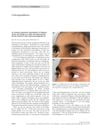21 citations,
April 2019 in “Journal of cutaneous pathology” People with alopecia areata have fewer regulatory T-cells than those with other skin conditions.
21 citations,
December 2014 in “Clinics in dermatology” Squaric acid dibutylester effectively treats alopecia areata.
 21 citations,
February 2012 in “Journal of the European Academy of Dermatology and Venereology”
21 citations,
February 2012 in “Journal of the European Academy of Dermatology and Venereology” Late-onset alopecia areata in Taiwanese patients is more common in women, usually starts at age 57, often involves less than 10% hair loss, and may have a minimal link to thyroid issues.
 20 citations,
August 2018 in “Clinics in Dermatology”
20 citations,
August 2018 in “Clinics in Dermatology” The conclusion is that understanding and addressing the psychological effects of alopecia areata is important for effective treatment.
 19 citations,
June 2015 in “Seminars in Cutaneous Medicine and Surgery”
19 citations,
June 2015 in “Seminars in Cutaneous Medicine and Surgery” There is no cure for alopecia areata, and treatment success depends on the individual's situation.
 18 citations,
January 2014 in “Postępy Dermatologii i Alergologii”
18 citations,
January 2014 in “Postępy Dermatologii i Alergologii” Personalized treatment plans are important for people with alopecia areata.
 17 citations,
July 1994 in “Journal of Dermatological Science”
17 citations,
July 1994 in “Journal of Dermatological Science” The cause of alopecia areata is likely a mix of genetics, immune system issues, and environmental factors, with more research needed to understand it fully.
17 citations,
March 1994 in “Pediatric Dermatology” Vitiligo and alopecia areata may share common causes.
 16 citations,
January 2021 in “Dermatology and therapy”
16 citations,
January 2021 in “Dermatology and therapy” An imbalance in gut bacteria is linked to skin immune diseases and may affect their outcomes and related health issues.
 16 citations,
November 2016 in “Journal of Cosmetic and Laser Therapy”
16 citations,
November 2016 in “Journal of Cosmetic and Laser Therapy” Laser and light therapies, especially the 308 nm excimer laser, are effective and safe for treating alopecia areata, but more research is needed.
 15 citations,
October 2020 in “Journal of Investigative Dermatology Symposium Proceedings”
15 citations,
October 2020 in “Journal of Investigative Dermatology Symposium Proceedings” Platelet-Rich Plasma (PRP) could potentially help regrow hair in people with Alopecia Areata, but more research is needed to confirm its effectiveness.
 15 citations,
August 2019 in “Dermatologic Therapy”
15 citations,
August 2019 in “Dermatologic Therapy” Platelet-rich plasma (PRP) may help treat hair loss in patients with frontal fibrosing alopecia who don't respond to other treatments.
 15 citations,
November 2015 in “Journal of Dermatology and Dermatologic Surgery”
15 citations,
November 2015 in “Journal of Dermatology and Dermatologic Surgery” Mixing platelet-rich plasma with triamcinolone acetonide can potentially improve hair regrowth in alopecia areata patients.
15 citations,
October 2013 in “Journal of the American Academy of Dermatology” Vitiligo patients should be routinely screened for thyroid disease and, if extensive or prolonged, also for RA, PA, and type 2 diabetes.
 15 citations,
April 2003 in “Journal of dermatology”
15 citations,
April 2003 in “Journal of dermatology” Alopecia areata causes hair loss due to an immune attack on hair follicles, influenced by genetics and environment.
14 citations,
December 2017 in “Journal of Investigative Dermatology Symposium Proceedings” New therapies for alopecia areata show potential but need more research.
14 citations,
March 2017 in “Genes and immunity” Certain microRNAs may help treat alopecia areata by targeting immune pathways.
14 citations,
June 2011 in “Australasian Journal of Dermatology” An 8-year-old boy had both alopecia areata and vitiligo on the same spot on his scalp, which is very rare.
 14 citations,
November 2009 in “Clinical and experimental dermatology”
14 citations,
November 2009 in “Clinical and experimental dermatology” Topical prostaglandin E2 can help treat both alopecia areata and vitiligo.
13 citations,
January 2020 in “Acta Dermato Venereologica” Ruxolitinib treatment led to unexpected hair regrowth in a patient with alopecia universalis.
 13 citations,
December 2006 in “Journal of experimental animal science”
13 citations,
December 2006 in “Journal of experimental animal science” Interferon gamma alone can't cause alopecia areata in C3H/HeJ mice.
12 citations,
March 2023 in “Frontiers in immunology” Atopic dermatitis increases the risk of some autoimmune diseases.
 12 citations,
January 2015 in “Indian Journal of Dermatology, Venereology and Leprology”
12 citations,
January 2015 in “Indian Journal of Dermatology, Venereology and Leprology” A mother and daughter with similar hair loss conditions and identical HLA types suggest a genetic link between the conditions.
 11 citations,
December 2018 in “Journal of the European Academy of Dermatology and Venereology”
11 citations,
December 2018 in “Journal of the European Academy of Dermatology and Venereology” Stopping JAK inhibitor treatment for hair loss can lead to worse hair loss than before the treatment.
 11 citations,
March 2018 in “Anais Brasileiros de Dermatologia”
11 citations,
March 2018 in “Anais Brasileiros de Dermatologia” Betamethasone can effectively treat alopecia areata.
10 citations,
November 2016 in “Clinical and experimental dermatology” PAS III can cause multiple autoimmune diseases with noticeable skin issues.
10 citations,
April 2003 in “Clinical neurology and neurosurgery” Autoimmune polyglandular syndrome can cause temporary brain issues that may improve on their own.
 9 citations,
January 2020 in “Postepy Dermatologii I Alergologii”
9 citations,
January 2020 in “Postepy Dermatologii I Alergologii” Frontal fibrosing alopecia is a poorly understood condition with increasing cases and unclear treatment effectiveness.
 9 citations,
May 2019 in “Journal of dermatological treatment”
9 citations,
May 2019 in “Journal of dermatological treatment” Apremilast helps regrow hair in hard-to-treat alopecia areata.
9 citations,
July 2016 in “JAAD case reports” Denosumab treatment for osteoporosis can cause hair loss.

















